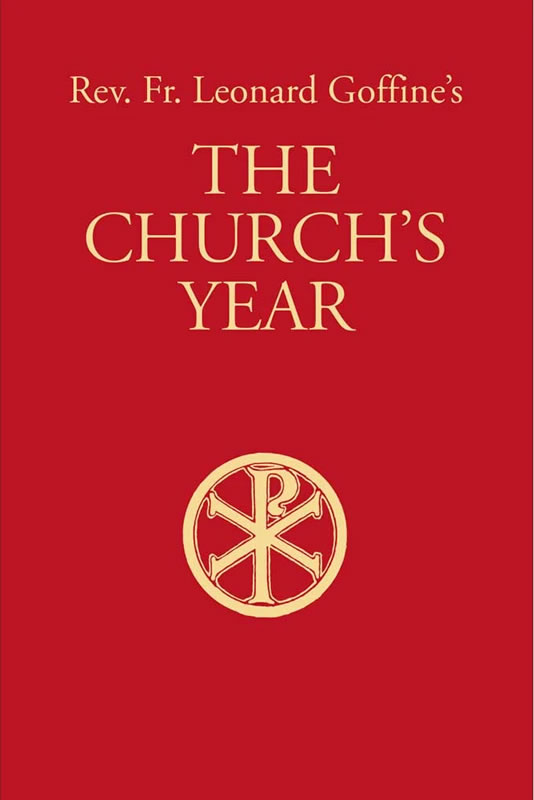
O God, Heavenly Father of Mercy, God of all Consolation! we thank Thee that from our birth to this day, Thou hast so well preserved us, and hast protected us in so many dangers; we beseech Thee, through the merits of Thy beloved Son, and by His sacred blood which He shed for us on this day in His circumcision, to forgive all the sins which, during the past year, we have committed against Thy commandments, by which we have aroused Thy indignation and wrath against ourselves. Preserve us in the coming year from all sins, and misfortunes of body and soul. Grant that from this day to the end of our lives, all our senses, thoughts, words, and works, which we here dedicate to Thee for all time, may be directed in accordance with Thy will, and that we may finally die in the true Catholic faith, and enjoy with Thee in Thy kingdom a joyful new year, that shall know no end. Amen.
New Year’s Day
Why is this day so called?
Because the secular year begins with this day, as the Church year begins with the First Sunday in Advent.
What should we do on this day?
An offering of the new year should be made to God, asking His grace that we may spend the year in a holy manner, for the welfare of the soul.
Why do we wish each other a “happy new year”?
Because to do so is an act of Christian love; but this wish should come from the heart, and not merely from worldly politeness, otherwise we would be like the heathens (Mt. 5:47), and receive no other reward than they.
What feast of the Church is celebrated today?
The Feast of the Circumcision of our Lord, Who, for love of us, voluntarily subjected Himself to the painful law of the Old Covenant, that we might be freed from the same.
What was the Circumcision?
It was an external sign of the Old Law, by which the people of that day were numbered among the chosen people of God, as now they become, by baptism, members of the Church of Christ.
What is the signification of Circumcision in the moral or spiritual sense?
It signifies the mortification of the senses, of evil desires, and inclinations. This must be practiced by Christians now, since they have promised it in baptism which would be useless to them without the practice of mortification; just as little as the Jew by exterior Circumcision is a true Jew, just so little is the baptized a true Christian without a virtuous life. Beg of Christ, therefore, today, to give you the grace of the true Circumcision of heart.
PRAYER: I thank Thee, O Lord Jesus, because Thou hast shed Thy blood for me in Circumcision, and beg Thee that by Thy precious blood I may receive the grace to circumcise my heart and all my senses, so that I may lead a life of mortification in this world, and attain eternal joys in the next. Amen.
COLLECT: O God, Who, by the fruitful virginity of blessed Mary, hast bestowed upon mankind the rewards of eternal salvation; grant, we beseech Thee, that we may feel the benefit of her intercession for us, through whom we have deserved to receive the author of life, our Lord Jesus Christ, Thy Son, who livest and reignest, etc.
GOSPEL: (Lk. 2:21). At that time, after eight days were accomplished that the child should be circumcised, his name was called Jesus, which was called by the angel before he was conceived in the womb.
Why did Jesus submit to Circumcision?
That He might show His great love for us, which caused Him even at the very beginning of His life, to shed His blood to cleanse us thereby from all our sins. Furthermore to teach us obedience to the commandments of God and His Church, since He voluntarily subjected Himself to the Jewish law, although He was not in the least bound by it, which ordered that every male child should be circumcised on the eighth day after its birth (Lev. 12:3).
Why was He named Jesus?
Because Jesus means Redeemer and Savior, and He had come to redeem and save the world (Mt. 1:21). This is the holiest, most venerable, and most powerful name by which we can be saved.
What power has this name?
The greatest power, for it repels all attacks of the evil Spirit, as Jesus Himself says (Mk. 16:17). And so great is the efficacy of this most holy name that even those who are not righteous, can by it expel devils (Mt. 7:22). It has power to cure physical pains and evils, as when used by the apostles (Acts. 3:3-7), and Christ promised that the faithful by using it could do the same (Mk. 16:17).
St. Bernard calls the name of Jesus a “Medicine”; and St. Chrysostom says, “This name cures all ills; it gives succor in all the ailments of the soul, in temptations, in faintheartedness, in sorrow, and in all evil desires, etc.” “Let him who cannot excite contrition in his heart for the sins he has committed, think of the loving, meek, and suffering Jesus, invoke His holy name with fervor and confidence, and he will feel his heart touched and made better,” says St. Lawrence Justinian.
It overcomes and dispels the temptations of the enemy: “When we fight against Satan in the name of Jesus,” says the martyr St. Justin, “Jesus fights for us, in us, and with us, and the enemies must flee as soon as they hear the name of Jesus.” It secures us help and blessings in all corporal and spiritual necessities, because nothing is impossible to him who asks in the name of Jesus, whatever tends to his salvation will be given him (Jn. 14:13).
Therefore it is useful above all things, to invoke this holy name in all dangers of body and soul, in doubts, in temptations, especially in temptations against holy chastity, and still more so when one has fallen into sin, from which he desires to be delivered; for this name is like oil (Cant. 1:2) which cures, nourishes, and illumines.
How must this name be pronounced to experience its power?
With lively faith, with steadfast, unshaken confidence, with deepest reverence and devotion, for in the name of Jesus every knee should bow, of those that are in heaven, on earth, and under the earth (Phil. 2:10). What wickedness, then, is theirs who habitually pronounce this name carelessly and irreverently, upon every occasion! Such a habit is certainly diabolical; for the damned and the devils constantly abuse God and His holy name.
Why does this name so seldom manifest its power in our days?
Because Christian faith is daily becoming weaker, and confidence less, while perfect submission to the will of God is wanting. When faith grows stronger among people, and confidence greater, then will the power of this most sacred name manifest itself in more wonderful and consoling aspects.
PRAYER TO JESUS IN DIFFICULTIES
O Jesus! Consolation of the afflicted! Thy name is indeed poured out like oil; for Thou dost illumine those who sit in darkness and in the shadow of death; Thou dost disperse the blindness of the soul and dost cure its ills; Thou givest food and drink to those who hunger and thirst after justice. Be also, O Jesus! my Savior, the physician of my soul, the healer of its wounds. O Jesus! Succor of those who are in need, be my protector in temptations! O Jesus! Father of the poor, do Thou nourish me! O Jesus! joy of the angels, do Thou comfort me! O Jesus! my only hope and refuge, be my helper in the hour of death, for there is given us no other name beneath the sun by which we may be saved, but Thy most blessed name Jesus!
EXHORTATION St. Paul says: All whatsoever you do in word or in work, all things do ye in the name of the Lord Jesus Christ (Col. 3:17). We should, therefore, follow the example of the saints, and continually say, at least in our hearts: “For love of Thee, O Jesus, I rise; for love of Thee I lie down; for love of Thee I eat, drink, and enjoy myself; for love of Thee I work, speak, or am silent.” Thus we will accustom ourselves to do all in the name of Jesus, by which everything is easily or at least meritoriously accomplished.
New Year’s Day Prayer Source: “The Church’s Year” by Leonard Goffiné. Leonard Goffiné (1648 – 1719) was a German Catholic priest who wrote devotional texts which remain influential in the Catholic church up to this time.

-
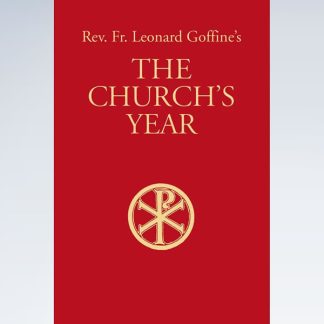 The Church’s YearUS$ 52.00
The Church’s YearUS$ 52.00 -
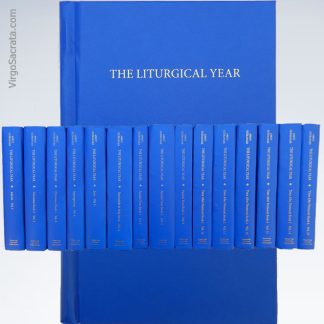 Liturgical Year 15 Volume Set, By Dom GuerangerUS$ 265.00
Liturgical Year 15 Volume Set, By Dom GuerangerUS$ 265.00 -
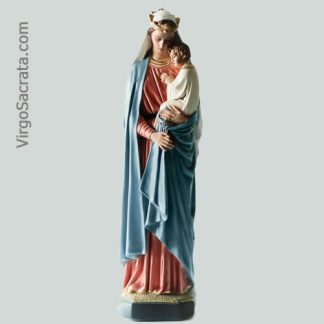 Queen Mary And Child Jesus Statue 25″US$ 360.00
Queen Mary And Child Jesus Statue 25″US$ 360.00 -
 Douay-Rheims Bible – Red CoverUS$ 44.00
Douay-Rheims Bible – Red CoverUS$ 44.00 -
 The Haydock Bible with Commentary (The Douay-Rheims Old and New Testament)US$ 150.00
The Haydock Bible with Commentary (The Douay-Rheims Old and New Testament)US$ 150.00 -
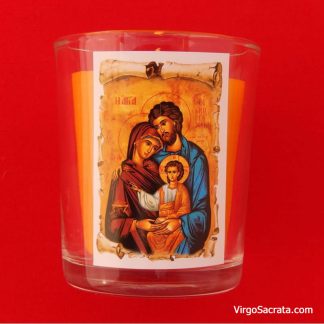 Holy Family Votive Candles – 100% Pure BeeswaxUS$ 33.00 – US$ 59.00
Holy Family Votive Candles – 100% Pure BeeswaxUS$ 33.00 – US$ 59.00
VIRGÓ SACRÁTA is a Christian mission-driven online resource and shop inspired from the beauty of Catholic faith, tradition, and arts. Our mission is to “Restore All Things to Christ!”, in continuing the legacy of Pope St. Pius X under the patronage of the Blessed Virgin Mary. “Who is she that cometh forth as the morning rising, fair as the moon, bright as the sun, terrible as an army set in battle array?” O Mary, conceived without sin, pray for us who have recourse to Thee.


